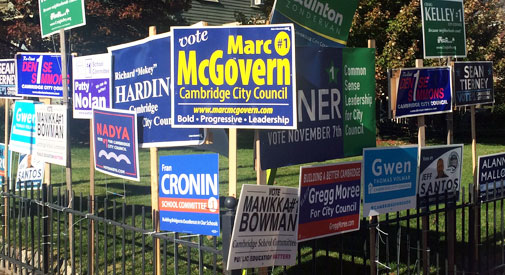What’s coming for Cambridge, the council, with profiles of every candidate for 2017

A veritable wall of campaign posters stands at Chester Street and Massachusetts Avenue in North Cambridge. (Photo: Marc Levy)
The past City Council term was an improvement for collegiality, but not so much that there aren’t plenty of council candidates touting their ability to be collegial; and it saw big steps forward for affordable housing, but not so much that every council candidate isn’t still talking about an affordable housing crisis.
![]() Transportation infrastructure and those reviled bike lanes became an issue, partially because the city had been slow to act responsibly on the matter but acted with alarm after two bicyclists died in Inman and Porter squares. The Foundry building, Volpe center redevelopment, graduate student housing, climate change, the opioid crisis, failing public transit, small business being forced out, the Comcast monopoly on Internet, early childhood education, open space, workforce training and the arts economy – all had a moment or two of attention since the 2015 elections, and all will inevitably be back with even more urgency, because nothing has been solved.
Transportation infrastructure and those reviled bike lanes became an issue, partially because the city had been slow to act responsibly on the matter but acted with alarm after two bicyclists died in Inman and Porter squares. The Foundry building, Volpe center redevelopment, graduate student housing, climate change, the opioid crisis, failing public transit, small business being forced out, the Comcast monopoly on Internet, early childhood education, open space, workforce training and the arts economy – all had a moment or two of attention since the 2015 elections, and all will inevitably be back with even more urgency, because nothing has been solved.
And most will arise against the backdrop of the release of a citywide development master plan draft, when the city will essentially be told its priorities coming out of a three-year process by the consultant Utile, and probably be shocked at what it hears. Expect a lengthy reexamination by the council led off by many, many three-minute chunks of public comment at multiple hearings.
With three councillors opting out of reelection bids – this hasn’t happened since 1989 – there will be an influx of fresh but uncertain legislative talent to handle the load. “Next year half the City Council will have less than five years of experience,” Mayor E. Denise Simmons had her proxy note at an Oct. 17 candidate forum, in an ostensible bid for voters to return longtime councillors such as herself and Tim Toomey to their council seats. But it’s worth noting that councillors with the longest runs in office are also the most culpable in letting the housing crisis reach this breaking point.
Simmons has been on the council since 2002, Craig Kelley since 2006 and Toomey since 1990. It was 2002 when a study arrived suggesting the city raise its developer “linkage” fee to help build affordable housing, but it was left to die in committee, leaving millions of dollars untapped; five council terms passed before it was brought up again. The inclusionary housing law that determines how many affordable units get built in larger residential projects was set in 1998 and not updated until last spring, even though it was long known that the law was broken and causing the city’s affordability to slip farther behind.
Experience counts, but it’s not everything, and it’s only one factor to consider when handed a ballot Tuesday with 26 council candidates to rank. (Unclear on how to vote in Cambridge’s ranked form of “proportional representation” elections? Check out Jean Cummings’ notes before heading to the polls; and look at Tom Stohlman’s analysis of how the 2015 elections played out, and why.)
The ranks of council candidates this year include experts and practitioners in urban planning (Dennis Carlone), the arts (Olivia D’Ambrosio), government accountability (Jan Devereux), transportation (Devereux again, and Jeff Santos), hunger (Alanna Mallon), homelessness, drugs and other social ills (Marc McGovern and Gwen Volmar), finance and data management (Adriane Musgrave and Bryan Sutton), immigration and entrepreneurship (Sumbul Siddiqui and Vatsady Sivongxay), education (Richard Harding and Paul Toner), climate change (Quinton Zondervan), futurism and law enforcement (Craig Kelley) and of course housing (Sean Tierney, especially).
Every candidate has strengths; some are weaker than others. The images below link to profiles of each with a little biography, some sense of their legislative priorities, outside endorsements and a bit of analysis. (Note that candidate photos link to their websites, when available; Facebook and Twitter links are more obvious.) Incumbents, who tend to have the advantage in elections, might find a downside: They are scrutinized closer than challengers, simply because they have a record of achievements and behavior that can be scrutinized. The views expressed in the incumbent profiles are based as much, if not more, on performance as elected officials as they are on promises of what’s to come.
Feel free to use the comments area to share your views of candidates, the race and what faces Cambridge in the next two years.
The candidates, 2017
Click on a photo to see the candidate’s profile and analysis
![]()






























Wow, excellent and informative post. Thank you